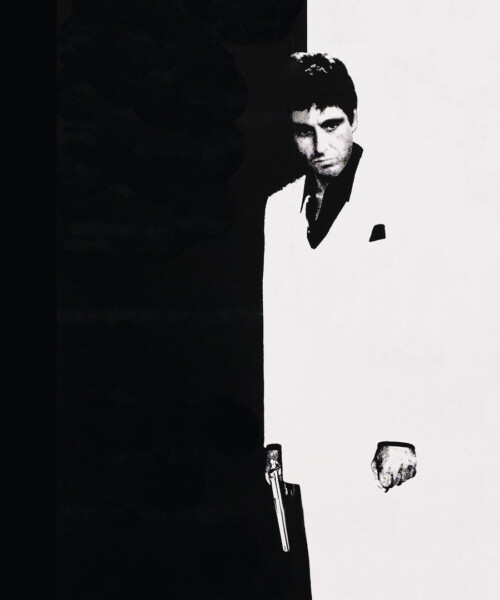
Scarface tanked at the box office; the $25 million picture earned only $44 million during its first theatrical run and then seemed to melt away.
“I frankly couldn’t understand it,” Pacino says.
Pauline Kael of The New Yorker called it “a long druggy spectacle…manic yet exhausting.” Rex Reed said, “Noisy, grim. Ultimately, it makes you feel mugged.”
Fortunately, the public didn’t listen to the critics. Thanks to cable and video and an enthusiastic response in Europe and the Middle East, Scarface gradually morphed into a cult hit.
At the start of the 1990s, Pacino began receiving more and more residual checks for Scarface. Whenever he was filming in Europe, people would come up to him and say, “Hey, Tony Montana!” Hip-hop was flourishing—as was the crack trade. For a lot of rappers who came up in that era, the movie seemed to embody their moment. In 2003, Sean “Diddy” Combs said he’d seen the movie 63 times. Rapper Trick Daddy put Venetian blinds with Tony Montana’s face on them over his bed and the band Blink 182 claimed it took its name from the number of times Pacino’s character says “fuck” in the film.
“Scarface is a cautionary tale for poor guys who suddenly strike it rich,” says Combs. “Montana violated his own maxim—don’t get high on your own supply. He was destroyed by his own arrogance.”
For a number of years, USC Professor Todd Boyd lectured on Scarface in his course on hip hop culture. “Scarface did everything so big,” Boyd told the L.A. Times. “I know people who modeled their weddings after his, anyone at the bottom of the totem pole wanted to emulate Montana smoking that cigar in his sunken tub.”
The film’s appeal crosses many boundaries. A Wall Street businessman once told Pacino that the line he and his colleagues love best is, “Why don’t you try sticking your head up your ass, see if it fits?” Millions of students, everywhere from Groton to the Sorbonne, own the film. Since Universal released a two-disc digitally remastered DVD in the fall of 2003, it has sold 4 million units worldwide and is going strong. A theatrical re-release for two weeks the same year played to sold-out theaters. In 2011, a Blu-ray edition was released.
Brian De Palma has a theory as to why this film has become a classic. “Tony Montana is the antihero contemporary kids identify with,” says the director. “He’s about greed and power and self-destruction in the land of opportunity, unfettered by morality.”
Still, there are many movies about a hustler who gets rich but then loses it all. Why is Scarface in a category by itself? According to Pacino, it has to do with the “two-dimensional” essence of a man inspired by a blimp floating across the Miami sky flashing the words, “The World Is Yours.” Pacino says: “Brian thought of it as an opera, and so did I. An opera in the Brechtian sense, with an exaggerated sense of style. What you see is what you get—that was the idea. It wasn’t about why he dies but what he does, period.
“Tony Montana,” adds Pacino, “was never meant to be reflective.”
MORE:
Robert De Niro on Pfeiffer, The Godfather and Gandolfini
The Untold History of the National Enquirer
Secrets of Hollywood’s Casting Business









































